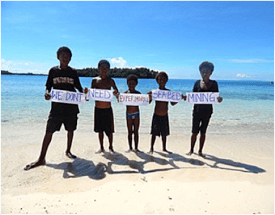Experimental seabed mining is not 'world class"

Source: Rosa Koian
‘World class’ has become such a nice catch phrase that even members of parliament ride with it without really giving some thoughts to what it means.
This week member for Chuave Mr Wera Mori decides to come out of his shadow and be a mouthpiece for Nautilus Minerals and welcomes ‘world class experimental seabed mining ‘ in PNG.
Mr Mori however, fails to realize that for PNG to be the first to test a technology for seabed resource extraction is never best for this country. The seabed mining technology is never going to be Papua New Guinea’s. Poverty and pristine ecosystem destruction however, will be Papua New Guinea’s.
Nautilus Minerals has ignored all calls to stop this destructive test project. They have bullied PNG into an, unnecessary arbitration outside of the country and forcing PNG to pay up US$118 million.
In a country stricken by poverty US$118 million will go a very long way to help with health and education services and the long overdue police housing. To throw away this amount of money on an unprofitable exercise is a miserable mistake for PNG.
As well as the Solwara 1 experiment Papua New Guinea has added to its ‘world class’ list the dumping ground for all sorts of rejects; lamp flaps, sheep tongue, chicken feet, used clothes, used cars, used barges, outdated medicine, factory rejects of consumer items and the list goes on.
How low can PNG go for a very high traditional culture that boasts thousands of years of crafting, that an experiment is allowed to take away the only shark calling culture in the world? Shark calling is by Papua New Guinea standards world class and is not an import but created by Papua New Guineans.
‘World class’ often promises good, best, the first, the richest and so on and even though Papua New Guineans are not new to the negative impacts of terrestrial resources extraction, particularly mining, many leaders bend when dollars dance. Words like these (world class) make human minds lazy and turn populations into dependent and expectant communities. The will to produce anything disappears and they wait for outsiders to bring them gifts and oftentimes they end up with gifts of unhappiness and poverty.
Papua New Guinea would do well if its leaders like Wera Mori would do a little bit of homework before picking up the microphone.
